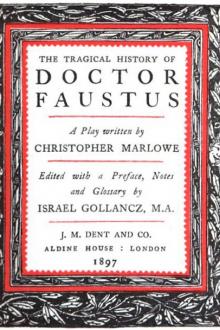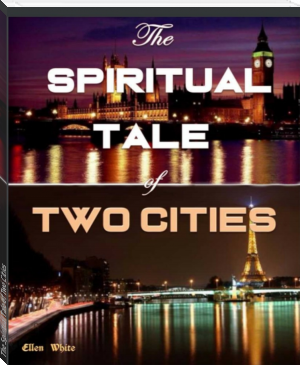Insurgency, Ellen Gould-Harmon [good novels to read in english .TXT] 📗

- Author: Ellen Gould-Harmon
Book online «Insurgency, Ellen Gould-Harmon [good novels to read in english .TXT] 📗». Author Ellen Gould-Harmon
In 1516 Zwingli was invited to become a preacher in the convent at Einsiedeln. Here he was to have a closer view of the corruptions of Rome and was to exert an influence as a Reformer that would be felt far beyond his native Alps. Among the chief attractions of Einsiedeln was an image of the Virgin which was said to have the power of working miracles. Above the gateway of the convent was the inscription, "Here a plenary remission of sins may be obtained."-- Ibid., b. 8, ch. 5. Pilgrims at all seasons resorted to the shrine of the Virgin; but at the great yearly festival of its consecration multitudes came from all parts of Switzerland, and even from France and Germany. Zwingli, greatly afflicted at the sight, seized the opportunity to proclaim liberty through the gospel to these bondslaves of superstition.
"Do not imagine," he said, "that God is in this temple more than in any other part of creation. Whatever be the country in which you dwell, God is around you, and hears you. Can unprofitable works, long pilgrimages, offerings, images, the invocation of the Virgin or of the saints, secure for you the grace of God? What avails the multitude of words with which we embody our prayers? What efficacy has a glossy cowl, a smooth-shorn head, a long and flowing robe, or gold-embroidered slippers? God looks at the heart, and our hearts are far from Him." "Christ," he said, "who was once offered upon the cross, is the sacrifice and victim, that had made satisfaction for the sins of believers to all eternity."-- Ibid., b. 8, ch. 5. To many listeners these teachings were unwelcome. It was a bitter disappointment to them to be told that their toilsome journey had been made in vain. The pardon freely offered to them through Christ they could not comprehend. They were satisfied with the old way to heaven which Rome had marked out for them. They shrank from the perplexity of searching for anything better. It was easier to trust their salvation to the priests and the pope than to seek for purity of heart.
But another class received with gladness the tidings of redemption through Christ. The observances enjoined by Rome had failed to bring peace of soul, and in faith they accepted the Saviour's blood as their propitiation. These returned to their homes to reveal to others the precious light which they had received. The truth was thus carried from hamlet to hamlet, from town to town, and the number of pilgrims to the Virgin's shrine greatly lessened. There was a falling off in the offerings, and consequently in the salary of Zwingli, which was drawn from them. But this caused him only joy as he saw that the power of fanaticism and superstition was being broken. The authorities of the church were not blind to the work which Zwingli was accomplishing; but for the present they forbore to interfere. Hoping yet to secure him to their cause, they endeavoured to win him by flatteries; and meanwhile the truth was gaining a hold upon the hearts of the people.
Zwingli's labours at Einsiedeln had prepared him for a wider field, and this he was soon to enter. After three years here he was called to the office of preacher in the cathedral at Zurich. This was then the most important town of the Swiss confederacy, and the influence exerted here would be widely felt. The ecclesiastics by whose invitation he came to Zurich were, however, desirous of preventing any innovations, and they accordingly proceeded to instruct him as to his duties. "You will make every exertion," they said, "to collect the revenues of the chapter, without overlooking the least. You will exhort the faithful, both from the pulpit and in the confessional, to pay all tithes and dues, and to show by their offerings their affection to the church. You will be diligent in increasing the income arising from the sick, from masses, and in general from every ecclesiastical ordinance." "As for the administration of the sacraments, the preaching, and the care of the flock," added his instructors, "these are also the duties of the chaplain. But for these you may employ a substitute, and particularly in preaching. You should administer the sacraments to none but persons of note, and only when called upon; you are forbidden to do so without distinction of persons."-- Ibid., b. 8, ch. 6.
Zwingli listened in silence to this charge, and in reply, after expressing his gratitude for the honour of a call to this important station, he proceeded to explain the course which he proposed to adopt. "The life of Christ," he said, "has been too long hidden from the people. I shall preach upon the whole of the Gospel of St. Matthew,…drawing solely from the fountains of Scripture, sounding its depths, comparing one passage with another, and seeking for understanding by constant and earnest prayer. It is to God's glory, to the praise of His only Son, to the real salvation of souls, and to their edification in the true faith, that I shall consecrate my ministry."-- Ibid., b. 8, ch. 6. Though some of the ecclesiastics disapproved his plan, and endeavoured to dissuade him from it, Zwingli remained steadfast. He declared that he was about to introduce no new method, but the old method employed by the church in earlier and purer times. Already an interest had been awakened in the truths he taught; and the people flocked in great numbers to listen to his preaching. Many who had long since ceased to attend service were among his hearers. He began his ministry by opening the Gospels and reading and explaining to his hearers the inspired narrative of the life, teachings, and death of Christ. Here, as at Einsiedeln, he presented the word of God as the only infallible authority and the death of Christ as the only complete sacrifice. "It is to Christ," he said, "that I desire to lead you--to Christ, the true source of salvation." -- Ibid., b. 8, ch. 6.
Around the preacher crowded the people of all classes, from statesmen and scholars to the artisan and the peasant. With deep interest they listened to his words. He not only proclaimed the offer of a free salvation, but fearlessly rebuked the evils and corruptions of the times. Many returned from the cathedral praising God. "This man," they said, "is a preacher of the truth. He will be our Moses, to lead us forth from this Egyptian darkness."-- Ibid., b. 8, ch. 6. But though at first his labours were received with great enthusiasm, after a time opposition arose. The monks set themselves to hinder his work and condemn his teachings. Many assailed him with gibes and sneers; others resorted to insolence and threats. But Zwingli bore all with patience, saying: "If we desire to gain over the wicked to Jesus Christ, we must shut our eyes against many things." -- Ibid., b. 8, ch. 6.
About this time a new agency came in to advance the work of reform. One Lucian was sent to Zurich with some of Luther's writings, by a friend of the reformed faith at Basel, who suggested that the sale of these books might be a powerful means of scattering the light. "Ascertain," he wrote to Zwingli, "whether this man possesses sufficient prudence and skill; if so, let him carry from city to city, from town to town, from village to village, and even from house to house, among the Swiss, the works of Luther, and especially his exposition of the Lord's Prayer written for the laity. The more they are known, the more purchasers they will find." -- Ibid., b. 8, ch. 6. Thus the light found entrance.
At the time when God is preparing to break the shackles of ignorance and superstition, then it is that Satan works with greatest power to enshroud men in darkness and to bind their fetters still more firmly. As men were rising up in different lands to present to the people forgiveness and justification through the blood of Christ, Rome proceeded with renewed energy to open her market throughout Christendom, offering pardon for money. Every sin had its price, and men were granted free license for crime if the treasury of the church was kept well filled. Thus the two movements advanced,--one offering forgiveness of sin for money, the other forgiveness through Christ,-- Rome licensing sin and making it her source of revenue; the Reformers condemning sin and pointing to Christ as the propitiation and deliverer.
In Germany the sale of indulgences had been committed to the Dominican friars and was conducted by the infamous Tetzel. In Switzerland the traffic was put into the hands of the Franciscans, under the control of Samson, an Italian monk. Samson had already done good service to the church, having secured immense sums from Germany and Switzerland to fill the papal treasury. Now he traversed Switzerland, attracting great crowds, despoiling the poor peasants of their scanty earnings, and exacting rich gifts from the wealthy classes. But the influence of the reform already made itself felt in curtailing, though it could not stop, the traffic. Zwingli was still at Einsiedeln when Samson, soon after entering Switzerland, arrived with his wares at a neighbouring town. Being apprised of his mission, the Reformer immediately set out to oppose him. The two did not meet, but such was Zwingli's success in exposing the friar's pretensions that he was obliged to leave for other quarters.
At Zurich, Zwingli preached zealously against the pardonmongers; and when Samson approached the place, he was met by a messenger from the council with an intimation that he was expected to pass on. He finally secured an entrance by stratagem, but was sent away without the sale of a single pardon, and he soon after left Switzerland. A strong impetus was given to the reform by the appearance of the plague, or Great Death, which swept over Switzerland in the year 1519. As men were thus brought face to face with the destroyer, many were led to feel how vain and worthless were the pardons which they had so lately purchased; and they longed for a surer foundation for their faith. Zwingli at Zurich was smitten down; he was brought so low that all hope of his recovery was relinquished, and the report was widely circulated that he was dead. In that trying hour his hope and courage were unshaken. He looked in faith to the cross of Calvary, trusting in the all-sufficient propitiation for sin. When he came back from the gates of death, it was to preach the gospel with greater fervour than ever before; and his words exerted an unwonted power. The people welcomed with joy their beloved pastor, returned to them from the brink of the grave. They themselves had come from attending upon the sick and the dying, and they felt, as never before, the value of the gospel.
Zwingli had arrived at a clearer understanding of its truths, and had more fully experienced in himself its renewing power. The fall of man and the plan of redemption were the subjects upon which he dwelt. "In Adam," he said, "we are all dead, sunk in corruption and condemnation." -Wylie, b. 8, ch. 9. "Christ . . . has purchased for us a never-ending redemption. . . . His passion is





Comments (0)